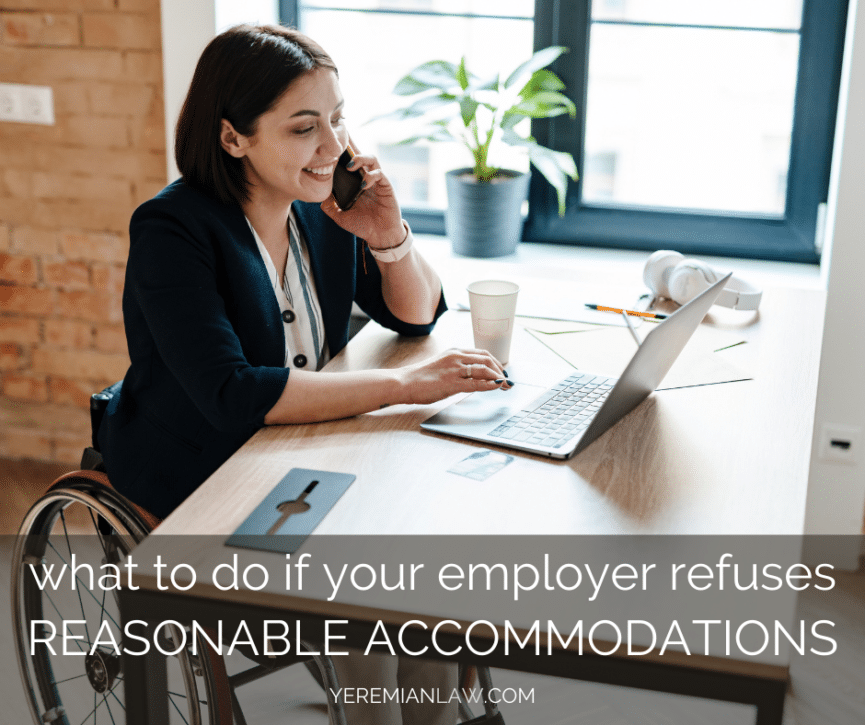Some people are entitled to reasonable accommodations in the workplace. But what do you do if your employer refuses? This guide explains
What Should You Do if Your Employer Refuses to Make Reasonable Accommodations?
Under Title I of the Americans With Disabilities Act, your employer is required to make reasonable accommodations in the workplace should you need them. By definition, a reasonable accommodation is any change to the job application or hiring process, the job itself or the way the job is performed, or the work environment to allow a person with a disability to perform as necessary while enjoying equal employment opportunities. Generally, accommodations are reasonable if they don’t create an undue hardship on the employer.
For example, providing a worker with text-to-speech software if that worker is unable to type due to a disability may be an example of a reasonable accommodation. Generally, this software is inexpensive and wouldn’t create an undue hardship on most employers. However, asking a small business owner to install an elevator in a rented building so an employee in a wheelchair may reach the top floor may be considered unreasonable.
Related: What to know about illegal job interview questions
Would the Accommodation Help You Perform Essential Functions of the Job?
if you cannot perform the essential functions of your job due to a disability, your employer is supposed to provide you with reasonable accommodations. Reasonable accommodations in this case may include things like changing your job duties, providing you with the software or equipment you need, or providing an aid or a service to increase your access.
How to Request Reasonable Accommodations at Work
Some people have excellent success by mentioning to a manager or supervisor that they need changes in the workplace. Your employer can’t make changes if they aren’t aware that you need them (or what changes would benefit you and the company).
If you decide to request accommodation, you must let your employer know that you are requesting them based on a reason related to a medical condition. You don’t need to mention the Americans with Disabilities Act or even use the phrase reasonable accommodations. You may use plain language, such as saying, “I’m having a hard time getting to work by 9:00 each morning due to my medical treatments. Can we talk about changing my schedule?” This is a request for a reasonable accommodation. Likewise, you may say to your employer, “My wheelchair doesn’t fit under the desk.” According to the Equal Employment Opportunity Commission, this is also a request for a reasonable accommodation.
Your request does not need to be in writing. Further, you may ask for a reasonable accommodation at any time during the application process or during the period of your employment.
For the record, asking for a more comfortable chair at work because your current chair is uncomfortable (not due to a medical condition) is not a request for reasonable accommodation. Your employer can simply tell you no because you have not established that your request is related to a medical condition.
Related: Can you be fired for being trans in California?
What if Your Employer Refuses Your Valid Request?
After you make a request for a reasonable accommodation, your employer should engage you to clarify exactly what you need and work with you to identify the appropriate action. Your employer is allowed to ask you relevant questions for clarification so you get the accommodation you need.
It’s important to note that your employer may ask you for documentation if your disability or the need for an accommodation is not obvious. Naturally, if your employer can see that your wheelchair doesn’t fit underneath your desk, they don’t need further information. However, if you tell your employer that you can’t pick something up due to a back injury (provided that picking up that item is part of your essential job functions), your employer may ask you for documentation that describes your impairment and provides more information.
If your employer lawfully requests information and you refuse to provide it, you are not entitled to a reasonable accommodation.
However, if you provide information, or if your disability is obvious, and your employer refuses to make what you consider a reasonable accommodation, you may want to escalate your request to the next higher supervisor. Or, in some cases, you may wish instead to contact an attorney to find out about your rights in your specific situation.
Related: California workers’ rights to a harassment-free workplace
Do You Need to Talk to an Attorney About Reasonable Accommodations?
If you feel your employer has refused a valid request for reasonable accommodation, we may be able to help you. Call our office at 818-230-8380 or fill out the form below to schedule your free consultation with a caring, experienced and knowledgeable Los Angeles employment attorney.




